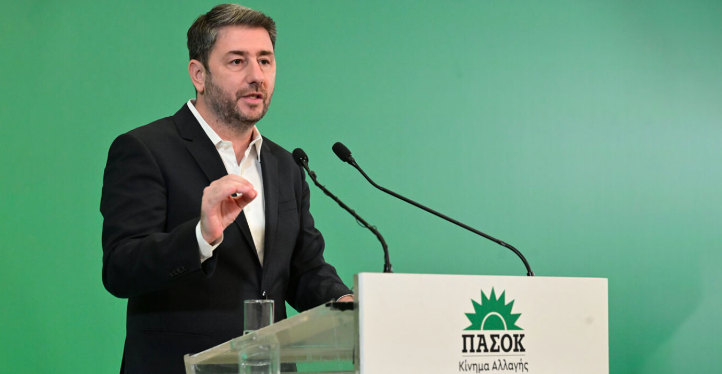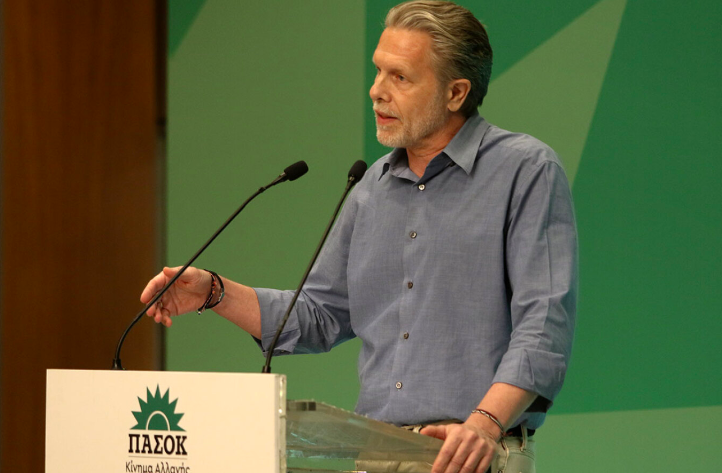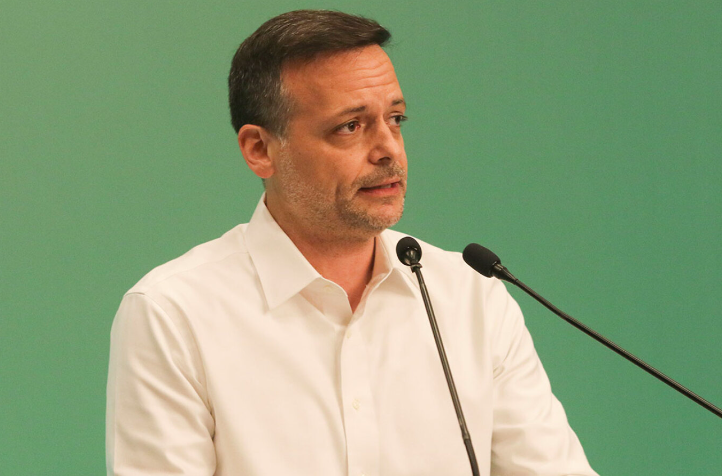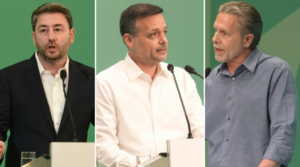PASOK Leadership Race: Candidates and Campaign Dynamics
The three candidates for the leadership of PASOK so far will meet in September. During the intervening days, Haris Doukas, Pavlos Geroulanos, and the current president, Nikos Androulakis, plan to seize every opportunity to promote their candidacies.
Yesterday’s Central Committee meeting highlighted Androulakis’ retreat towards the “doubts” line for the leadership election this autumn. He accepted Haris Doukas’ written request and accelerated the proposed steps, scheduling the election for October 6 and 13 for the first and second rounds.

As Androulakis announced his departure from adhering strictly to the statute for elections at the end of 2025, Doukas and Geroulanos prepared to present brief overviews of their candidacies. Haris Doukas declared, “I am stepping forward to make PASOK a governing force again. Let’s win now,” urging people to support his effort with massive participation and emphasizing the need for an open party free from mechanisms. He attacked New Democracy and outlined PASOK’s goal to win the next national elections, calling for intersections and ruptures rather than introversion.

Doukas seeks to keep communication channels open with forces relying on the Androulakis system, delivering a unifying speech that didn’t provoke the current leader’s core supporters. Despite Androulakis attacking Doukas and Christodoulakis over “backroom deals” and “personal ambitions,” he avoided creating conditions for open war within the critical session, claiming that speeding up the electoral process was necessary.

Intense backstage discussions preceded the meeting, with Androulakis admitting that delaying the top leadership election process was no longer viable. Supporters of Doukas, such as Petros Efthymiou, Kostas Skandalidis, Odysseas Konstantinopoulos, and Tonia Antoniou, chose not to further criticize Androulakis from the Central Committee platform. Manolis Christodoulakis left early to attend to his constituency, where he was actively engaged.
Doukas and Geroulanos Gear Up for PASOK Leadership Race
From today until the official premiere in September, Haris Doukas is planning a series of contacts, actions, and initiatives across Greece. He intends to strengthen his team with new allies, thoroughly vetting his strategy and tactical movements. He also aims to finalize his political “platform,” which he will present at the new Central Committee meeting in mid-September. Notably, the September 3 anniversary will be kept separate from the pre-election campaigns of the presidential candidates.
Pavlos Geroulanos praised the “unifying” timeline set by Nikos Androulakis, which includes candidate presentations at an open Central Committee meeting three weeks before the election. Geroulanos is committed to his strategic plan for the faction’s “rebirth” and will begin a series of regional tours to maximize his outreach, despite knowing that the summer months are not ideal for political discussions in cities and villages.
Doukas and Geroulanos aim to mobilize more members and friends to the polls than in the 2021 internal party elections. Their campaign will focus on encouraging participation, especially from those who were hesitant or abstained in recent elections. They hope to surpass the 270,000 votes cast in the 2021 elections, which included candidates like Androulakis, Papandreou, Loverdos, Geroulanou, Christidis, and Kastanidis.
Harilaou Trikoupi aims to boost participation with every election, as seen in 2021. However, there is a debate within PASOK about limiting “transient” voters. Manolis Othonas and others have proposed revising the electoral process to ensure it reflects true grassroots engagement. This could mean restricting voting to party members or those who register in advance, a move designed to maintain the integrity of the election.
The proposal raises questions about whether the leader should be elected solely by party members or by a broader societal base, and which candidates would benefit from such a change. Panos Vlachos suggested that any decision on this matter should apply to future elections, allowing for a detailed dialogue about the proposed changes.
While Androulakis, Doukas, and Geroulanos are the main candidates, some PASOK officials believe the list may remain open until early September. Figures like Michalis Katrini, Nadia Giannakopoulou, and Milena Apostolaki have also expressed interest in leadership roles, criticizing the current operating model and proposing changes.
There is also speculation about Anna Diamantopoulou’s interest in PASOK’s leadership. Although she has not confirmed or denied her candidacy, her political allies are reportedly gathering support for her.
Overall, the PASOK leadership race is shaping up to be dynamic, with key candidates preparing to engage in extensive campaigns and strategic positioning ahead of the elections.
Ask me anything
Explore related questions





